Wissenschaftliche Literatur Sovereignty
Eine Auswahl unserer Fachbücher
Falls bei Ihnen die Veröffentlichung der Dissertation, Habilitation oder Masterarbeit ansteht, kontaktieren Sie uns jederzeit gern.
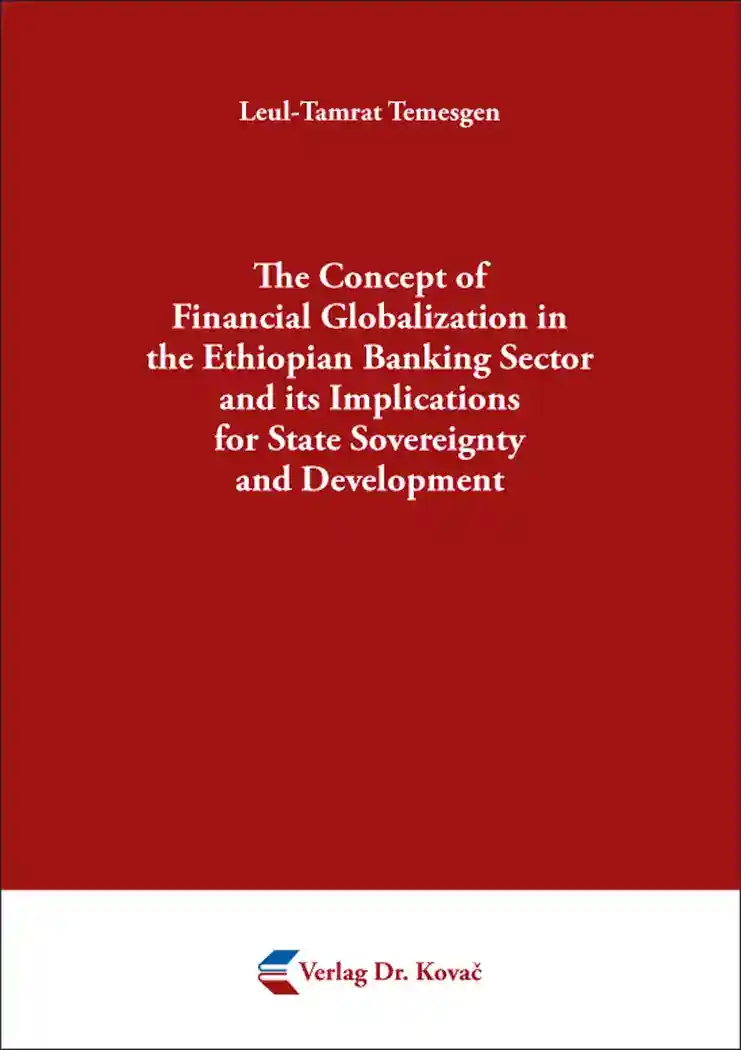 Zum Shop
Zum ShopLeul-Tamrat Temesgen
The Concept of Financial Globalization in the Ethiopian Banking Sector and its Implications for State Sovereignty and Development
Studien zum Völker- und Europarecht
In dieser Studie wird zunächst untersucht, ob die Ära der ersten ausländischen Banken in Äthiopien im 20. Jahrhundert Auswirkungen auf den aktuellen Umgang der äthiopischen Regierung mit ausländischen Banken hat.
Weiterhin werden die jüngsten Reformen und Gesetze in Bezug auf den Bankensektor in Äthiopien sowie der aktuelle Umgang mit ausländischen Finanzinstituten in Äthiopien untersucht. Der äthiopische Finanzsektor wurde im Lichte der Finanzglobalisierung…
ÄthiopienBankenDevelopmentEthiopian Banking SectorFinancial GlobalizationFinanzsektorGlobalisierungState SovereigntyWirtschaftsvölkerrechtWTO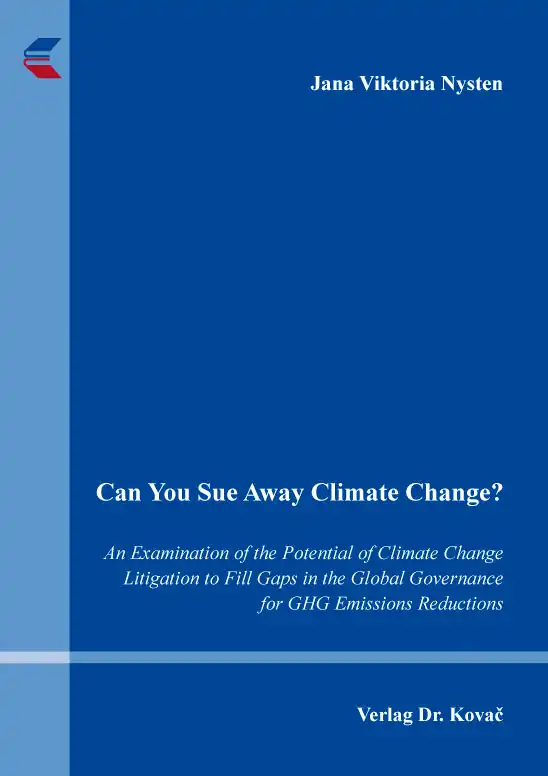
Jana Viktoria Nysten
Can You Sue Away Climate Change?
An Examination of the Potential of Climate Change Litigation to Fill Gaps in the Global Governance for GHG Emissions Reductions
Umweltrecht in Forschung und Praxis
Climate change litigation has been on the rise in recent years and the number of cases keeps increasing. Accordingly, a diverse – and partly heated - discussion has emerged in the legal literature: some argue that it could help fix the legal framework where political consent is lacking to enact respective laws or negotiate respective treaties, while others point to alleged limitations, such as the competences of courts in the different legal systems and the idea of…
GewaltenteilungInternationales RechtKlimaklagenKlimaschutzgesetzKlimawandelMenschenrechteStaatssouveränitätUmweltrecht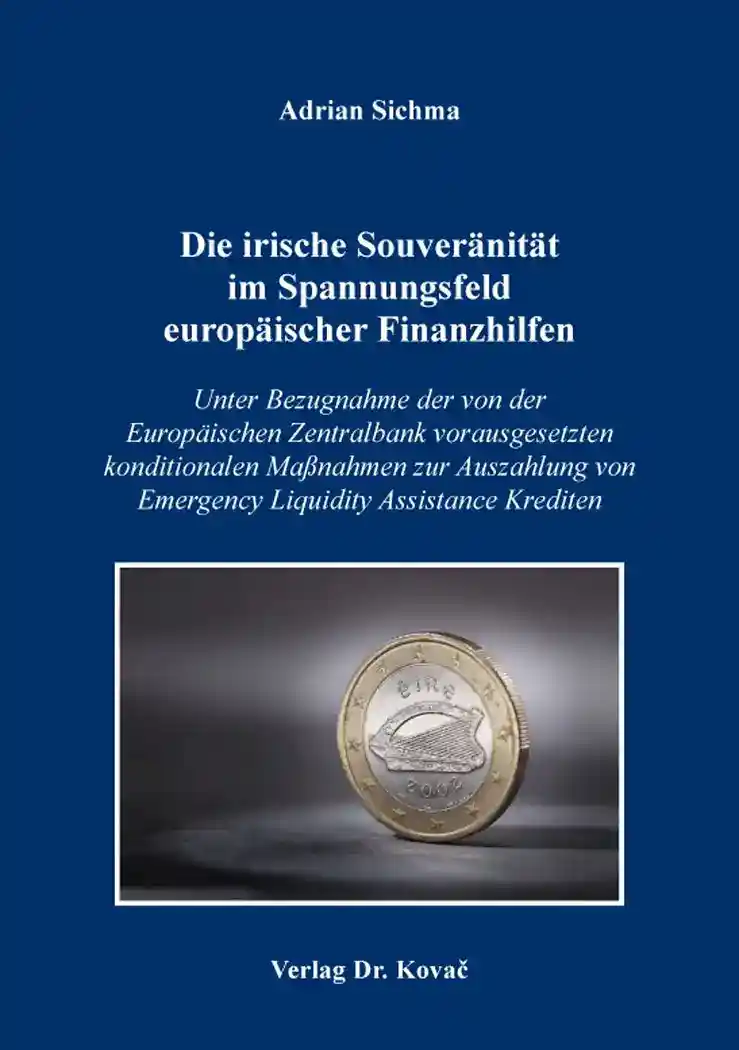
Adrian Sichma
Die irische Souveränität im Spannungsfeld europäischer Finanzhilfen
Unter Bezugnahme der von der Europäischen Zentralbank vorausgesetzten konditionalen Maßnahmen zur Auszahlung von Emergency Liquidity Assistance Krediten
Studien zum Völker- und Europarecht
Während der EU-Finanzkrise titelten irische Zeitungen teilweise von Irlands „lost economic sovereignty“. Eine geplatzte Immobilienblase und der Interbankenhandel schufen notleidende Finanzinstitute, die als „too big to fail“ galten.
Irlands Notenbank zahlte ELA-Kredite bis zu einer kritischen Grenze aus. Daraufhin knüpfte die EZB finanzstabilisierende Maßnahmen an die Genehmigung neuer ELA-Kredite. Die irische Regierung ist auf die Forderungen eingegangen, um…
ELAELA-KreditEmergency Liquidity AssistanceEuropäische ZentralbankEZBFinanzhilfenFinanzkriseIrlandKonditionale MaßnahmenMakroökonomisches UngleichgewichtNaturrechtRechtswissenschaftSelbstbestimmungSouveränitätStaatsschuldenStaatssouveränitätultra vires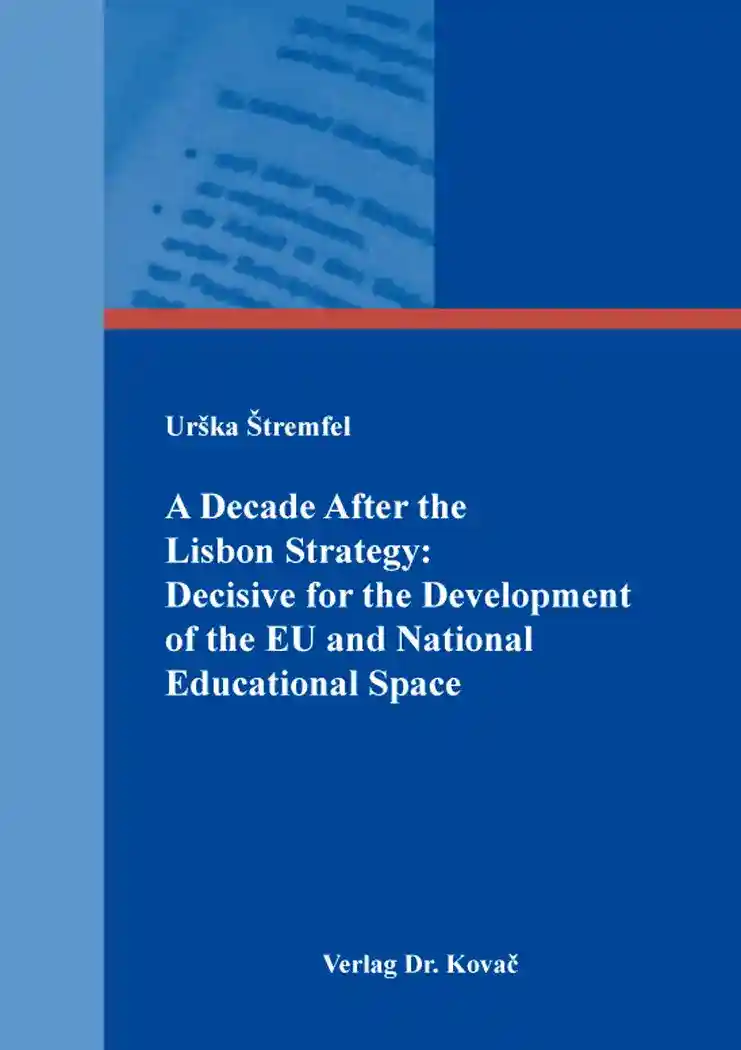 Zum Shop
Zum ShopUrška Štremfel
A Decade After the Lisbon Strategy: Decisive for the Development of the EU and National Educational Space
For a long time, education had been a more or less neglected policy field in European integration. The Lisbon Strategy (2000) marked the turning point, when education was first recognised as important for the social and economic development of the European Union (EU). Since then, EU cooperation in the field has significantly widened and deepened. Following the implementation of two strategic frameworks for European cooperation in education and training (2000–2010,…
BildungErziehungswissenschaftEuropäischer BildungsraumEuropäische UnionEuropäisierungLissabon-StrategieNew modes of governanceOffene Methode der KoordinierungPolitikSlowenien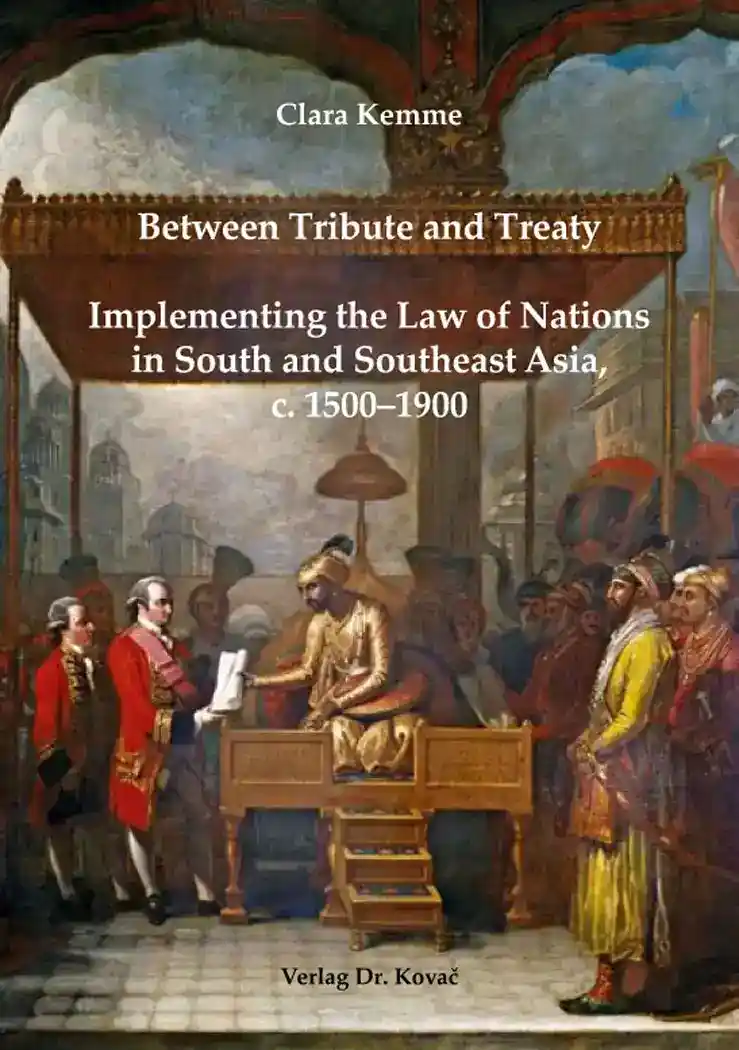 Zum Shop
Zum ShopClara Kemme
Between Tribute and Treaty: Implementing the Law of Nations in South and Southeast Asia, c. 1500–1900
Wie wurde das europäische Völkerrecht zu einer weltweit geltenden normativen Ordnung? Der Zusammenhang von Kolonialismus und Völkerrecht wird immer häufiger thematisiert. Bisher wurde die Geschichte des Völkerrechts überwiegend aus einer ideengeschichtlichen Perspektive betrachtet. Juristische Schriften europäischer Gelehrter waren die Grundlage der meisten Studien. Der ideengeschichtliche Kontext reicht jedoch nicht aus, um die politischen, kulturellen und ökonomischen…
AsienBritish IndiaDiplomacyDiplomatieEmpireGeschichteHistoryImperialismusIndienInternationales RechtInternational LawKolonialismusLaw of NationsNative StatesNetherlands East IndiesNormative OrdnungenSouveränitätSovereigntySüdostasienTreatyVerträgeVölkerrechtWorld Orders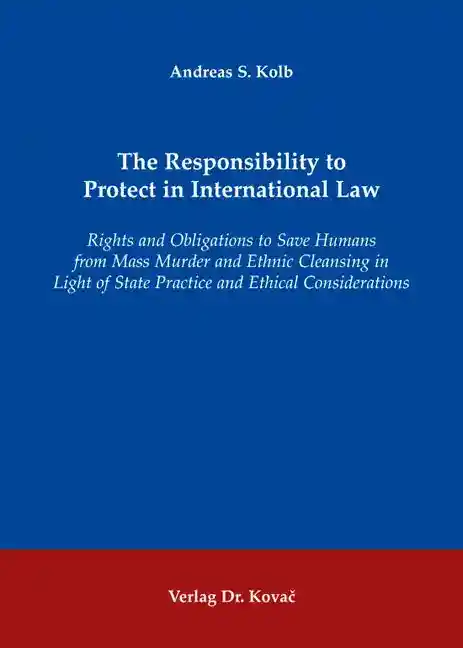 Zum Shop
Zum ShopAndreas S. Kolb
The Responsibility to Protect in International Law
Rights and Obligations to Save Humans from Mass Murder and Ethnic Cleansing in Light of State Practice and Ethical Considerations
Studien zum Völker- und Europarecht
Das Konzept der Schutzverantwortung (Responsibility to Protect, R2P/RtoP) wurde Ende 2001 von der International Commission on Intervention and State Sovereignty (ICISS) vorgestellt und hat seither zunehmend den politischen und akademischen Diskurs geprägt. Sein Ursprung liegt in dem Bestreben, die stark polarisierte Debatte über die Zulässigkeit sogenannter „humanitärer Interventionen“, d.h. militärischer Einsätze zum Schutze der Zivilbevölkerung eines fremden Staates…
EthikEthnische SäuberungenHumanitäre InterventionICISSInternational Commission on Intervention and state SovereigntyRechtsquellenlehreRechtswissenschaftRecht und EthikResponsibility to ProtectSchutzverantwortungSovereigntyStaatliche SouveränitätUNUN World Summit 2005Vereinte NationenVN-Weltgipfel 2005VölkermordVölkerrecht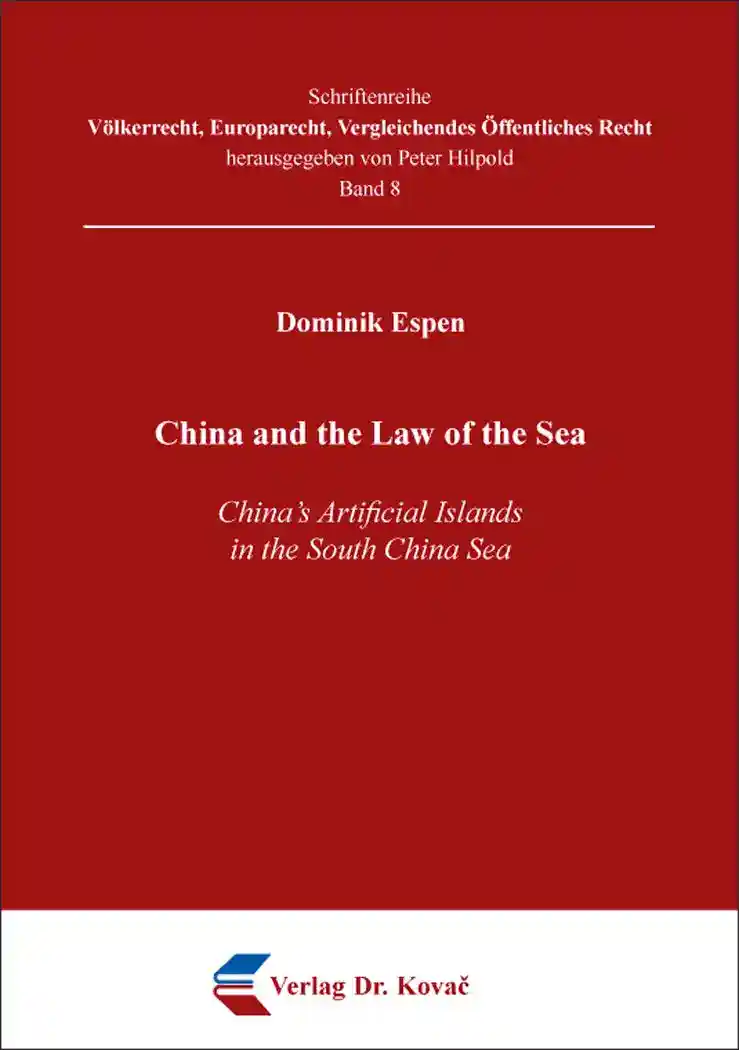 Zum Shop
Zum ShopDominik Espen
China and the Law of the Sea
China’s Artificial Islands in the South China Sea
Völkerrecht, Europarecht, Vergleichendes Öffentliches Recht
How much do you have to artificially alter an island until it changes into an artificial island? What is an artificial island after all? When is an island an island and not just a rock? When is high tide really high tide? What is a human habitation or what is an economic life? What is an area of land?
What sound like philosophical questions are actually immensely important legal questions affecting Trillions of Dollars in world trade, crude oil and fishery…
Art. 121 SRÜArt. 121 UNCLOSArtificial islandsInternational lawKünstliche InselnLaw of the seaOccupationOkkupationParacel InselnParacel IslandsSeerechtSouth China SeaSpratly InselnSpratly IslandsSüdchinesisches MeerVölkerrecht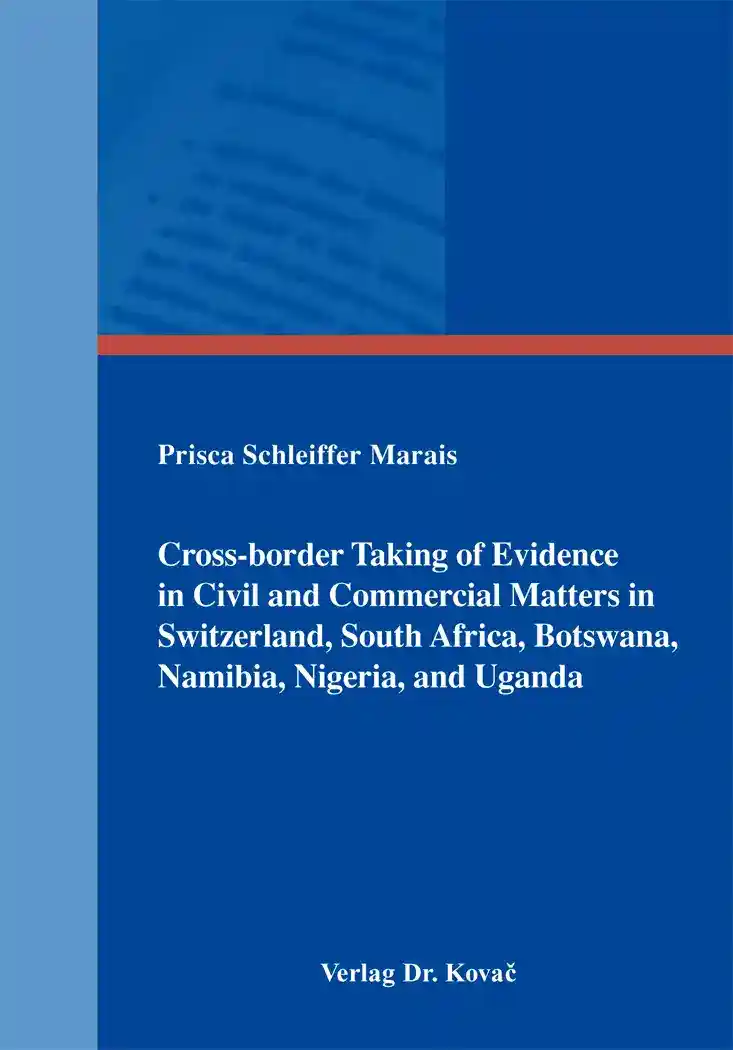 Zum Shop
Zum ShopPrisca Schleiffer Marais
Cross-border Taking of Evidence in Civil and Commercial Matters in Switzerland, South Africa, Botswana, Namibia, Nigeria, and Uganda
Schriften zum Zivilprozessrecht
The book investigates the extent to which cross-border taking of evidence in civil and commercial matters in relation to Switzerland, South Africa, Botswana, Namibia, Nigeria, and Uganda is allowed. Such evidence-taking is not only governed by the domestic law of the state seeking evidence abroad and that of the state where the relevant means of proof are located, but also by public international law, and more specifically by the concept of sovereignty. The admissibility…
BeweismittelCommissionerCourtoisie internationaleGrenzüberschreitende BeweisaufnahmeHoheitsaktInternationale RechtshilfeRechtshilfeersuchenSouveränitätVölkerrechtZivilprozessrecht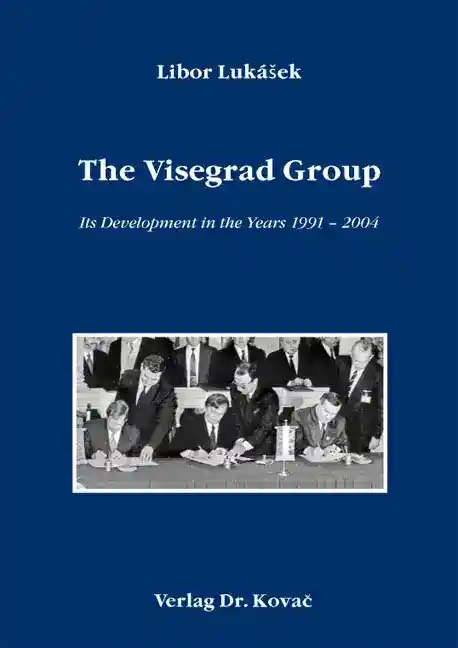 Zum Shop
Zum ShopLibor Lukášek
The Visegrad Group
Its Development in the Years 1991 – 2004
Schriften zur Geschichtsforschung des 20. Jahrhunderts
The Visegrad Group is an alliance of Eastern European countries (the Czech Republic, Hungary, Poland, and Slovakia) founded 15 February 1991 in Visegrad with the presidents of Czechoslovakia, Hungary, and Poland signing a „Declaration on mutual cooperation for further European integration.“ The strategic goals of the Group were to fill in the security-economic vacuum created in the region as the result of the fundamental international political changes at the end of the…
CooperationIntegrationNATORegional CooperationRegionalismSecurityVisegrad CooperationVisegrad GroupZeitgeschichte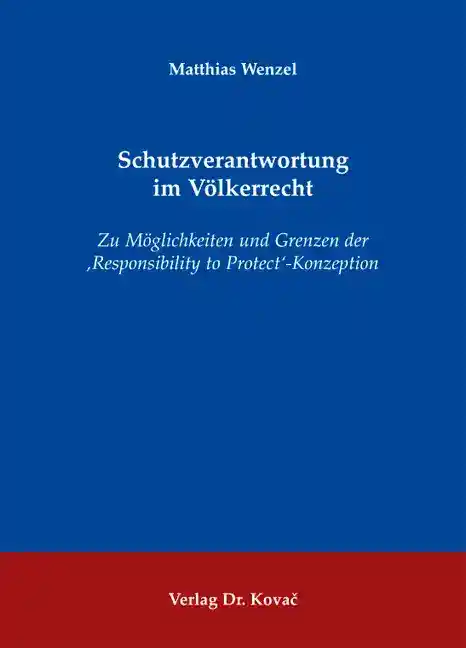 Zum Shop
Zum ShopMatthias Wenzel
Schutzverantwortung im Völkerrecht
Zu Möglichkeiten und Grenzen der ‚Responsibility to Protect‘-Konzeption
Studien zum Völker- und Europarecht
Neben dem "Kampf gegen den Terror" zählt die Verhinderung von schweren Menschenrechtsverletzungen in innerstaatlichen Konflikten zu den bedeutendsten Problemen des Völkerrechts im ersten Jahrzehnt des 21. Jahrhunderts. Der Kampf von Aufständischen, Kriminellen, warlords gegen Regierungen folgt vor allem in Afrika, für Außenstehende schwer nachvollziehbar, komplett eigenen "Regeln". Weil in afrikanischen Kriegen immer auch ethnische Konflikte ausgetragen werden,…
Afrikanische UnionBurundiECOWASElfenbeinküsteICISSInnerstaatliche KonflikteKongoLiberiaMenschenrechtsverletzungNaturkatastropheRechtswissenschaftResponsibility to ProtectSchutzverantwortungSicherheitsrat der Vereinten NationenSolidaritätStaatengemeinschaftSudanUN-SicherheitsratVölkermordVölkerrecht